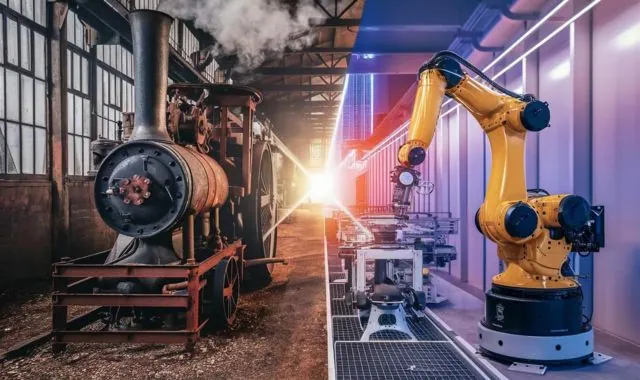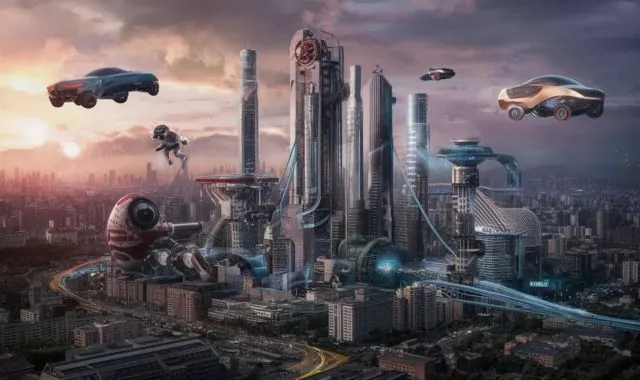Physical Address
304 North Cardinal St.
Dorchester Center, MA 02124
Physical Address
304 North Cardinal St.
Dorchester Center, MA 02124

Mechanical technology, from simple tools to complex robots, shapes our world. This article explores its core principles, how it works in everyday machines, and its fascinating history. We look ahead to a future filled with mechatronics, 3D printing, and biomimicry, all driven by mechanical innovation.

Have you ever stopped to think about the intricate dance of gears, levers, and pistons that power our world? From the moment you wake up to the convenience of a hot cup of coffee, mechanical technology is invisibly woven into the fabric of our daily lives. This article delves into the captivating realm of mechanics, exploring its fundamental principles, groundbreaking inventions, and the exciting future that lies ahead.
Mechanical technology is the science and engineering of designing, building, and operating machines. It encompasses everything from the simplest tools like a lever or wedge to complex systems like robots and spaceships.
The history of mechanical technology stretches back millennia. Early humans used basic tools like hammers and inclined planes to manipulate their environment. As our understanding of physics grew, so did the sophistication of our machines. Today, mechanical engineers utilize advanced materials, computer-aided design (CAD), and cutting-edge manufacturing techniques to create marvels of engineering.
The fundamental principles of mechanics, such as force, motion, and energy transfer, govern how machines operate. Understanding these principles allows engineers to design machines that perform specific tasks efficiently.
Let’s take a peek inside some everyday machines to witness the magic of mechanics in action:
The seemingly simple bicycle is a testament to the ingenuity of mechanical design. Gears and chains transfer the force from your pedaling to the wheels, propelling you forward.
Internal combustion engines, the workhorses of the transportation industry, convert chemical energy from fuel into mechanical work. The four-stroke cycle – intake, compression, combustion, and exhaust – is the heart of this process.
Imagine a piston moving back and forth inside a cylinder. During the intake stroke, air and fuel enter the cylinder. Compression squeezes the mixture. Ignition causes combustion, driving the piston down (power stroke). Finally, the exhaust stroke pushes out the burnt gases. This cycle repeats, generating the power that propels vehicles.
From the refrigerator that keeps your food fresh to the washing machine that cleans your clothes, your home is filled with mechanical marvels. Even the simple doorknob relies on mechanical principles like leverage to function.

The story of mechanical technology is one of continuous innovation and progress:
The Industrial Revolution, fueled by advancements in mechanics, transformed societies. Machines replaced manual labor, leading to mass production and economic growth.
Robotics and automation are revolutionizing industries. Robots, guided by computer programs, perform tasks with precision and speed, while automation streamlines processes and improves efficiency.
The future of mechanical technology is brimming with exciting possibilities:
Mechatronics, the fusion of mechanics and electronics, is creating a new generation of intelligent machines. These machines can sense, analyze, and adapt to their environment, blurring the lines between mechanical and electronic systems.
3D printing is transforming manufacturing by enabling the creation of complex objects layer-by-layer. This technology allows for rapid prototyping, customization, and on-demand production.
By studying nature’s ingenious designs, biomimicry inspires the development of new mechanical technologies. For example, studying the wings of birds has led to advancements in aircraft design.
Mechanical technology has profoundly shaped our world:
From manufacturing and transportation to healthcare and construction, mechanical technology is the backbone of modern economies. It creates jobs, drives innovation, and fuels economic growth.
Mechanical technology has made our lives easier, safer, and more comfortable. From the clean water we drink to the communication networks we use, mechanics are behind many of the conveniences we take for granted.
As with any powerful tool, mechanical technology comes with considerations. Ethical concerns surrounding automation and the environmental impact of manufacturing processes need to be addressed for sustainable progress.
Curious to delve deeper into the fascinating world of mechanics? Here are some ways to get started:
Numerous online resources, books, and educational programs can introduce you to the fundamentals of mechanics. Explore interactive simulations, watch educational videos

Mechanical technology is a cornerstone of human progress. It has transformed our world, allowing us to travel farther, build taller, and explore the universe. As we continue to innovate and push the boundaries of what’s possible, mechanical technology will undoubtedly play a vital role in shaping a better future.
On the contrary, mechanical technology is a constantly evolving field. With advancements in robotics, automation, and 3D printing, the demand for skilled mechanical engineers is expected to grow.
A successful career in mechanical technology requires a strong foundation in math, physics, and engineering principles. Additionally, problem-solving skills, creativity, and the ability to work effectively in teams are crucial.
Many resources are available to learn more about mechanical technology. You can take online courses, enroll in a mechanical engineering degree program, or explore educational websites and museums with exhibits on mechanical engineering.
The list is vast, but some notable inventions include the printing press, the steam engine, the automobile, the airplane, and the robot.
Mechanical technology plays a vital role in spacecraft design, propulsion systems, robotic arms for exploration and maintenance, and life-support systems for astronauts.